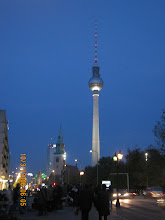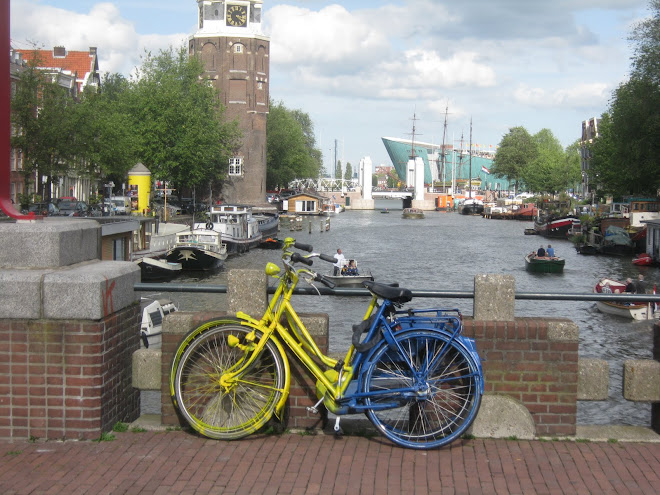On Saturday evening, I went with Martin to a festival at Domplatz where there was, aside from music and beer, bungee jumping. I watched the people springing from sixty meters, my emotions running a weird loop between envy and cowardice. (The envy of that experience led to a desire to do it myself. Then upon noticing that I sort of wanted to do that too, the cowardly side drowned out all desire to do it, leaving me in envious awe of the people who were brave enough to jump. The envy made me want to do it myself.)
I watched the people getting sort of saddled in, climbing into a metal box, waving to their friends on the ground, and then being hoisted up into the sky with a crane. There were different jumping styles. Some of them stood in the box for several minutes before they sprung. Some of them took off right away. Some of them stretched out their arms and lifted their heels off the ground several times before the actual spring.
One of them stood in the box a particularly long time. He prepared to spring several times, but his feet never left the platform. I craned my neck to see. Five minutes passed. People began to gather below and murmur to each other. Five more minutes passed. My neck hurt from craning. People began to chant, "Springe, springe, springe!" The crowd wasn't going to let him back down easily. But he didn't spring.
I tried to remember the German expression for "between a rock and a hard place" so that I could describe the situation so to Martin, but I seemed to have forgotten it.
Martin said, "Spanne uns nicht auf die Folter! (By the way Anna, do you know this expression?)"
And I said, "My neck is getting a cramp (yes, I do know that one, thanks)."
The guy kept standing there, while the crowd below got more and more impatient with him. He had several false starts. Every time he got close to the edge and stretched his arms out, the crowd began to cheer. I still couldn't remember how to say "between a rock and a hard place," even though it had been in my online German flashcards loop that afternoon.
Sixty meters above, the man raised his arms like a bird, unsure before a first flight. I wondered why the attendant didn't just push him out of the nest. But if he jumped, my chance would be gone. It would be all over between me and this expression. I needed to know what it was.
His arms went back down. By now the crowd had doubled in size. "He must have terrible Höhenangst," I commented. Höhenangst is the same as acrophobia but sounds far more intense. But if he was so afraid, why did he pay 50 euros for the torture? The crowd began to chant again. Jump, jump, jump. 15 minutes had passed.What pressure. What beads of sweat must be forming on his brow. What was that freaking expression already?
Suddenly the big metal box began its descent back to Earth. A general boo of disappointment emanated from the groundlings. He returned to Earth as He Who Didn't Jump.
"He must feel pretty dumb," said Martin. He Who Didn't Jump set his feet on solid ground once again. Some people clapped. "However," conceded Martin, "you have to agree, not jumping is also brave in a way. He had the courage to say, 'hey, I'm not going to jump,' in front of that huge crowd."
I guess.
The jump went unjumped. The expression I'd been seeking after (zwischen Baum und Borke stecken) surfaced superfluously two days later. Some things can't be forced.
Tuesday, June 22, 2010
Subscribe to:
Post Comments (Atom)















No comments:
Post a Comment